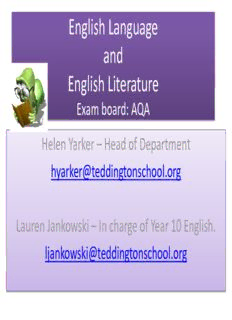
English Language and English Literature Exam board: AQA PDF
Preview English Language and English Literature Exam board: AQA
English Language and English Literature Exam board: AQA Helen Yarker – Head of Department [email protected] Lauren Jankowski – In charge of Year 10 English. [email protected] A new specification … • Key points: • All students will study for both Language and Literature GCSEs. • There are no higher or foundation papers anymore. • There is no coursework. • Exams are closed book. • They will be graded 9-1 rather than A* - C Implications for students • Wider reading of both fiction and non fiction is essential. Modern literature and preferably some Victorian literature as well. • Organised, meticulous, legible note taking. • Regular comprehension practice. • The more students read and the more they regularly revise the better they will do. Revision should be a slow drip rather than just a waterfall. What we study -Language • English Language • English Language • • • Paper 1 Explorations in creative reading • Paper 2: Writers’ viewpoints and perspectives and writing: • 50% of GCSE • 50% of GCSE • TIME: 1 hour forty five minutes • TIME 1 hour 45 minutes • Section A: Reading • Section A: Reading • one non-fiction text and one literary non-fiction • one literature fiction text text • Section B: Writing • Section B: Writing • descriptive or narrative writing • writing to present a viewpoint • • Questions • Questions • Reading (40 marks) (25%) – two linked texts • Reading (40 marks) (25%) – two linked • 1 short form question (1 x 4 marks) texts • 2 longer form questions (1 x 8, 1 x 12 marks) • 1 short form question (1 x 4 marks) • 1 extended question (1 x 16 marks) • 2 longer form questions (1 x 8, 1 x 12 • Writing (40 marks) (25%) marks) • 1 extended writing question (24 marks for • 1 extended question (1 x 16 marks) content, 16 marks for technical accuracy) • Writing (40 marks) (25%) • 1 extended writing question (24 marks for content, 16 marks for technical accuracy) Literature: • Literature Paper 1: Shakespeare and Literature Paper 2: Modern texts and poetry the nineteenth century novel • 1 hour 45 minutes 2 hour 15 minutes • 40% of GCSE 60% of GCSE Questions • Questions • Section A Shakespeare: students will Section A Modern texts: students will answer one answer one question on their play of essay question from a choice of two on their studied choice. They will be required to write modern prose or drama text. An Inspector Calls in detail about an extract from the Section B Poetry: students will answer one play and then to write about the play comparative question on one named poem printed on as a whole. the paper and one other poem from their chosen • Section B The 19th-century novel: anthology cluster. students will answer one question on their novel of choice. They will be Section C Unseen poetry: Students will answer one required to write in detail about an question on one unseen poem and one question extract from the novel and then to comparing this poem with a second unseen poem. write about the novel as a whole. Units studied in term 1 Autumn 1 Autumn 2 An Inspector Calls (Literature) Language Paper 1 and 2 ‘Bugs!’ And ‘Fight for Freedom!’ Unit work • Sense of the whole text. • Reading a range of fiction and non fiction texts. • Use of textual evidence in a closed book conditions. • Explain, comment on and analyse how writers use language to achieve effects and • Developing a critical response to influence readers. the text. • Use relevant subject terminology. • Developing exam writing skills • compare writers’ ideas and perspectives, as well as how these are conveyed, across two or more texts • Evaluate texts critically and support with quotations. Units studied in Term 2 Spring 2: Spring 1 Language Paper 1 and 2 Literature – Poetry Cluster Unit work: ‘Trapped!’ and • Overview of poems in the cluster ‘All in the Mind’ chosen by the class teacher. Strengthening • Making links and connections between understanding and the poems and contexts. practice of skills from • Analysis of language, form and Autumn 2 structure. • Ability to use more developed comparative structures. Units studied in Term 3 Summer 1 Summer 2: Literature – 19th Century prose Language paper 1 and 2 Unit work: ‘Town and Country’ • Read and understand 19th century novel. • Develop analysis of writer’s craft. Embedding skills learned and developed in Autumn 2 and Spring 2 • Developing a personal response to the novel. • Analysis of language, form and structure. • Demonstrate understanding between writer and context • Use of quotations • Develop written responses to GCSE style questions. How can you support your child with English Language and Literature? • Read with them and ask them questions about the themes, characters, plot and language of the texts you read (newspapers, travel writing, classics, teen texts). • Encourage them to read classics, both modern and pre- 1900. Check their comprehension of texts with discussion. • Purchase study guides to the set texts. • Purchase Bond books to develop comprehension skills, grammar and vocabulary. • Check they are regularly completing homework and to the best of their ability. Contact class teacher if you are concerned. Year 10 Core Information Evening Mathematics Ingrid Kosch – Curriculum Leader
Description: